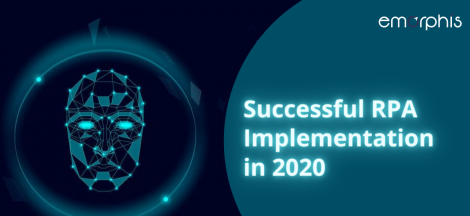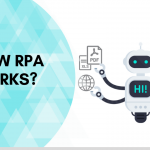Introduction
Robotic Process Automation or RPA has brought significant changes in the world by offering automation solutions to every sector notable of which include banking, insurance, BPO, and many more.
Utilizing RPA in your business enterprise can help in total digitalization of your functioning like social media management, and solve issues related to mobile technology and cloud computing effectively.
Implementation of RPA software into any specific company might sound optimal, but in fact, it’s true. Unfortunately, it does not appear as easy as it may look. It is because of various challenges that wait for you during the implementation of the given tool.
So, it is a novice to think that Robotic Process Automation software is a perfect combination to offer you the solution you require to achieve success in your field. Dozens of challenges defy your smooth transaction towards automation via RPA software tools.
In the given article, there will be a focus on some of the top RPA challenges that act as a roadblock for those organizations that are undergoing the automation process.
I. Failure to Keep to the Hype of Realistic Expectations
Given the popularity of RPA service solutions, it is easy to fall prey to the enthusiasm created around the given software. It is a clear-cut procedure that before going for a new process, it is wise to have a plan for it, and at the same time, the management should have a clear idea about its outcomes. Sadly, most of the businessmen fail in the case of RPA.
Lack of clarity concerning the outcomes may hurt the completion of any given project. Different companies have different working patterns and failure to adapt to it may create hurdles in making whole working procedures fully automated.
The only way to overcome the given challenge is to create awareness among the employees to remove the confusion prevailing in their minds and permit them to work with clarity. With it, all departments can work together and with great enthusiasm.
II. The dearth of Skilled Resource
No one can disagree with the given fact that RPA is now booming to meet the ever-increasing demand of today’s market, and has somewhat achieved its target. However, the shortage of experts is proving to be one of the greatest threats to the RPA market.
The success of any project lies in the hands of a knowledgeable team, but in the case of RPA, it is hampering the efficiency of the organization due to the unavailability of professionals who are accustomed to the given software.
Also, if one gets access to the RPA professionals, it is still difficult to fulfill their needs. It is because they expect a lucrative package for their service which might not be possible for many companies as it may affect them financially.
III. Managing Stiff Resistance from Employees
There is a narrative that is gaining significant momentum against automation- “It will steal our jobs.” It is the core reason why most of the employees of those organizations who are opting for RPA are unable to accept the new technologies.
The changes brought by automation sometimes prove to be counter-productive and may result in a few job losses. But, considering it as the main culprit in snatching the jobs away from the employees is utterly false. However, the majority of the firms are unable to explain it to their staff.
So, the workers start protesting the implementation of the enterprise RPA in their functioning which might spoil the relationship between the firms and their employees. The given issue can only be solved by imparting training to the workers and creating a communication platform to solve their issues in operating the machine automatically.
IV. Selection of Wrong RPA Solution
One of the most basic issues faced by companies across the world is the adoption of the wrong RPA solution. It happens because most of the firms fail to receive guidance from the experts in selecting the best RPA service solutions for them.
Furthermore, the management realized their wrong decision during the implementation stage of the RPA, but it was too late to replace it with the fit one. Sometimes, the cost is also involved in it as choosing the wrong RPA tools that do not suit them might incur a high loss for them financially.
After some time, they become unable to cope with their needs which exceed the investment they have made and keep down their expectation. So before selecting the correct RPA tool, keep in mind its proper implementation as it will eventually help in your business for a longer duration.
V. Ineffective Maintenance of RPA
Technically, it is the phase that comes after completing the implementation of RPA in your working environment while successfully deploying all the processes. RPA solution needs maintenance because it tests its running and ability processes.
In case, work is more repetitive and rule-based, then maintaining your output is essential, and if you fail to initiate certain maintenance protocols; then be ready to face some difficulty. So, it becomes prudent for you to ensure the application of the protocol to stop the reoccurrence of issues that might harm your business prospects.
VI. Ownership of RPA Solution
Another important issue that affects the proper RPA implementation is the question- “Who will own the RPA?” The give flaw arises because enterprises often ignore giving due consideration to the skills, designs, and requirements of reputed RPA service providers.
If you want to achieve notable success in the RPA implementation, it becomes essential to have a seamless integration between the business function and the IT team. For this to happen, it must be made clear by the management who owns the given implementation.
Without proper ownership, it will become tough to address issues that might make them wait for more to achieve an effective resolution. Moreover, a lack of responsibilities will make the decision-making process more unclear and affect the given task’s proficiency.
VII. Lack of Required Support from Business Fraternity
RPA project cannot be successful until it gets provision of the business use cases that come with necessary workflow diagrams. It contains possible work-fail scenarios and the procession of different kinds of data by bots and technical experts effectively.
Nevertheless, suppose the business is not interested in offering wide support to the RPA projects. In that case, it will face numerous challenges such as the inability to get the creation of a process design document for passing the user acceptance tests. Without passing the given test, the business will be unable to get access to the critical feedback which will hamper its progress.
In the End
So, we have arrived at the end of the article with a detailed discussion about major challenges faced by an enterprise during the implementation of RPA software. Though robotic process automation is gaining high popularity with each passage of time, challenges associated with it are also increasing day by day.
The study also highlights the fact that most business fails to take care of the feedback that may come to their notice after automating their system which not only affects their proficiency but also create tension with their employees.
Thus, it is the time when you can get ready to fight the above-given challenges take the help of the best RPA consultants, and tackle all these issues with great ease.







